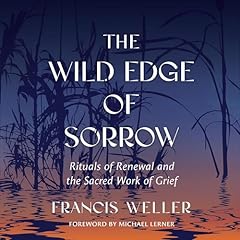
The Other Side of Sadness
What the New Science of Bereavement Tells Us About Life After Loss
No se pudo agregar al carrito
Solo puedes tener X títulos en el carrito para realizar el pago.
Add to Cart failed.
Por favor prueba de nuevo más tarde
Error al Agregar a Lista de Deseos.
Por favor prueba de nuevo más tarde
Error al eliminar de la lista de deseos.
Por favor prueba de nuevo más tarde
Error al añadir a tu biblioteca
Por favor intenta de nuevo
Error al seguir el podcast
Intenta nuevamente
Error al dejar de seguir el podcast
Intenta nuevamente
Prueba gratis de 30 días de Audible Standard
Selecciona 1 audiolibro al mes de nuestra colección completa de más de 1 millón de títulos.
Es tuyo mientras seas miembro.
Obtén acceso ilimitado a los podcasts con mayor demanda.
Plan Standard se renueva automáticamente por $8.99 al mes después de 30 días. Cancela en cualquier momento.
Compra ahora por $25.19
-
Narrado por:
-
Jonathan Todd Ross
The conventional view of grieving--encapsulated by the famous five stages of grief: denial, anger, bargaining, depression, and acceptance--is defined by a mourning process that we can only hope to accept and endure.
In The Other Side of Sadness, psychologist and emotions expert George Bonanno argues otherwise. Our inborn emotions--anger and denial, but also relief and joy--help us deal effectively with loss. To expect or require only grief-stricken behavior from the bereaved does them harm. In fact, grieving goes beyond mere sadness, and it can actually deepen interpersonal connections and even lead to a new sense of meaning in life.
Los oyentes también disfrutaron:




















Reseñas de la Crítica
"Perhaps the most renowned grief researcher in the United States ... Bonanno's work ... has redefined the science of grief research."—The Atlantic
"Fascinating and readable ... a sensitive and sensible view of loss."—New York Times
"A deep and intelligent book.... It's heartening to discover that grieving is not 'work,' we don't have to be successful at it, and we're stronger than we know."—Double X, Slate
"This is a valuable book for Bonanno's application of the scientific method to a field that badly needs it."—New Scientist
"The Other Side of Sadness is a game changer. Bonanno carefully assembles scientific evidence to show that most of what we thought we knew is just plain wrong. If you want to know the truth about the human experience of loss, there's only one book on the shelf."—Daniel Gilbert, professor of psychology, Harvard University, and author of Stumbling on Happiness
"Bonanno, the most productive and influential bereavement researcher in America today, has changed the scientific landscape in the field of grief and bereavement."—Camille Wortman, Professor of Psychology, Stony Brook University
"Brilliant and moving."—Dacher Keltner, professor of psychology, University of California, Berkeley, and author of Born to Be Good
"The Other Side of Sadness paints a refreshingly new and scientifically-grounded portrait of the grieving process, one infused with positivity, laughter, and enduring bonds. Anyone interested in the emotional nuances of the human condition will value this warm, engaging, and accessible book."—Barbara L. Fredrickson, Ph.D., Kenan Distinguished Professor, University of North Carolina, Chapel Hill and author of Positivity
"George Bonanno's ground-breaking research on grief illuminates mankind's profound capacity for resilience, and shows us how to find meaning in life after death."—Jim Whitaker, Founder and Director Project Rebirth
Las personas que vieron esto también vieron:










Some interesting ideas.
The audible version...
Se ha producido un error. Vuelve a intentarlo dentro de unos minutos.
Every young anxious person in the world should listen to it.
The antidote to pop science bogus fragility makers
Se ha producido un error. Vuelve a intentarlo dentro de unos minutos.
I’ve lost my husband in the last few months and have a hefty ACE (the author uses Potential Tramautic Event PTE) score. For the 15-25% who don’t just get over it, this book might make you feel worse. I agree with the author about not medicalizing normal human events, but neither our height-drama society or our for-profit healthcare system support a natural recovery.
If you have someone in your life who just needs to bounce back from death, trauma, etc. this book will help prove your point.
If you are suffering, this is not your book
Se ha producido un error. Vuelve a intentarlo dentro de unos minutos.


